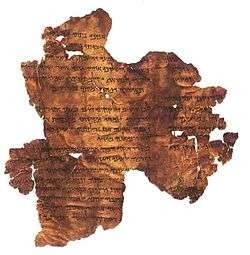Hosea 4
| Hosea 4 | |
|---|---|
 4Q166 "The Hosea Commentary Scroll", late first century B.C. | |
| Book | Book of Hosea |
| Bible part | Old Testament |
| Order in the Bible part | 28 |
| Category | Nevi'im |
Hosea 4 is the fourth chapter of the Book of Hosea in the Hebrew Bible or the Old Testament of the Christian Bible.[1][2] This book contains the prophecies spoken by the prophet Hosea son of Beeri. In this chapter he reproves the people and priests for their sins in the interregnum which followed Jeroboam's death; hence there is no mention of the king or his family; and in Hosea 4:2 bloodshed and other evils usual in a civil war are specified.[3] It is a part of the Book of the Twelve Minor Prophets.[4][5]
Text
- The original text is written in Hebrew language.
- This chapter is divided into 5 verses.
Textual versions
Some most ancient manuscripts containing this chapter in Hebrew language:
- Masoretic Text (10th century)
- Dead Sea Scrolls: (2nd century BC)[6][7]
Ancient translations in Koine Greek:
- Septuagint (3rd century BC)
- Theodotion version (~AD 180)
Structure
NKJV groups this chapter into:
- Hosea 4:1-10 = God's Charge Against Israel
- Hosea 4:11-19 = The Idolatry of Israel
Verse 6
- My people are destroyed for lack of knowledge:
- because thou hast rejected knowledge,
- I will also reject thee,
- that thou shalt be no priest to me:
- seeing thou hast forgotten the law of thy God,
- I will also forget thy children.[8]
- "My people are destroyed for lack of knowledge": Here the verb is plural and its subject singular, because, being collective, it comprehends all the individual members of the nation. The word כדמו is rendered (1) by Jerome in the sense of "silence:" "conticuit populus incus," which he explains to mean "sinking into eternal silence." So also the Chaldee.
(2) The LXX., understands it in the sense of "likeness:" "My people are like (ὡμοιώθη) as if they had no knowledge."[9] So Isaiah mourns in the same words, "therefore my people are gone into captivity, because they have no knowledge" Isaiah 5:13.[10]
- "lack of knowledge": "of God" (Hosea 4:1), that is, lack of piety. Their ignorance was wilful, as the epithet, "My people," implies; they ought to have known, having the opportunity, as the people of God.[3]
- "because thou hast rejected knowledge": I will also reject thee, that thou shall be no priest to me; the priests that Jeroboam made were of the lowest of the people, ignorant and illiterate men, 1 Kings 12:31 and they chose to continue such; they rejected with contempt and abhorrence, as the word signifies, the knowledge of God, and of all divine things[11]
See also
Notes and references
- ↑ Halley, Henry H. Halley's Bible Handbook: an abbreviated Bible commentary. 23rd edition. Zondervan Publishing House. 1963.
- ↑ Holman Illustrated Bible Handbook. Holman Bible Publishers, Nashville, Tennessee. 2012.
- 1 2 Robert Jamieson, Andrew Robert Fausset; David Brown. Jamieson, Fausset, and Brown's Commentary On the Whole Bible. 1871.

- ↑ Metzger, Bruce M., et al. The Oxford Companion to the Bible. New York: Oxford University Press, 1993.
- ↑ Keck, Leander E. 1996. The New Interpreter's Bible: Volume: VII. Nashville: Abingdon.
- 1 2 3 Dead sea scrolls - Hosea
- ↑ Timothy A. J. Jull; Douglas J. Donahue; Magen Broshi; Emanuel Tov (1995). "Radiocarbon Dating of Scrolls and Linen Fragments from the Judean Desert". Radiocarbon. 38 (1): 14. Retrieved 26 November 2014. Missing
|last4=in Authors list (help) - ↑ Hosea 4:6
- ↑ Joseph S. Exell; Henry Donald Maurice Spence-Jones (Editors). The Pulpit Commentary. 23 volumes. First publication: 1890.

- ↑ Barnes, Albert. Notes on the Old Testament. London, Blackie & Son, 1884. Reprint, Grand Rapids: Baker Books, 1998.

- ↑ John Gill. John Gill's Exposition of the Entire Bible. Exposition of the Old and New Testament. Published in 1746-1763.

Bibliography
- Collins, John J. (2014). Introduction to the Hebrew Scriptures. Fortress Press.
- Hayes, Christine (2015). Introduction to the Bible. Yale University Press.